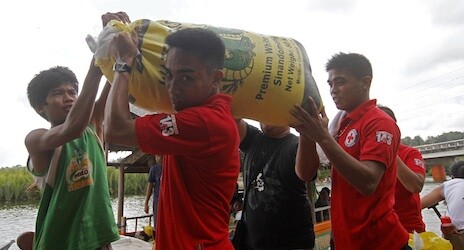
In response to Typhoon Haiyan, the strongest typhoon to make landfall in recorded history, authorities in the Philippines are implementing international recommendations that will reduce delays in the provision of humanitarian relief.
For several years, the Philippine Red Cross and IFRC have been working with authorities to develop streamlined rules and procedures for humanitarian relief, drawing on recommendations from international guidelines developed by the IFRC, as well as associated model legislation.
Richard Gordon, Chairman of Philippine Red Cross and co-author of Republic Act 10121 – also known as the National Disaster Risk Reduction and Management Act – said it was vital to ensure the goodwill of millions around the world was translated into tangible results on the ground. “There is an outpouring of support to people in the Philippines after this enormous disaster,” he said. “It is our goal to be an effective link between the available aid and all the people in need, and these regulations are critical to making that happen.
“We are committed to making sure that what people give, gets to where it should be.”
Consistent with those recommendations, the Philippines is now instituting ‘One-Stop Shop’ teams in areas affected by the typhoon. These consist of representatives from different national and local government departments and agencies with oversight authority for the entry of humanitarian goods, equipment and transport, in order to speed up the entry of relief.
This approach has proven effective after disasters in other countries, such as Indonesia and Guatemala, with significant reduction in bureaucratic delays. Without setting up mechanisms like these, vital relief can be delayed by the legal requirements imposed on international relief goods and personnel, including customs, tax and immigration procedures. Learning from previous large scale disasters, such as the 2004 Indian Ocean tsunami response which saw hundreds of containers of relief goods left in customs warehouses for over a year, the IFRC has been working with National Societies and Governments to reduce these legal barriers since 2007.
IFRC legal delegate Tessa Kelly, who has been temporarily deployed to respond to the Typhoon, said regulations could help to drive the efficiency of aid delivery, rather than slowing it down. “On the ground, the needs are enormous. And when people ask why aid isn’t reaching communities fast enough, a critical consideration is whether there are laws and regulations in place to support fast and effective humanitarian operations,” she said. “Legal frameworks serve as a backbone for all the other work taking place.”